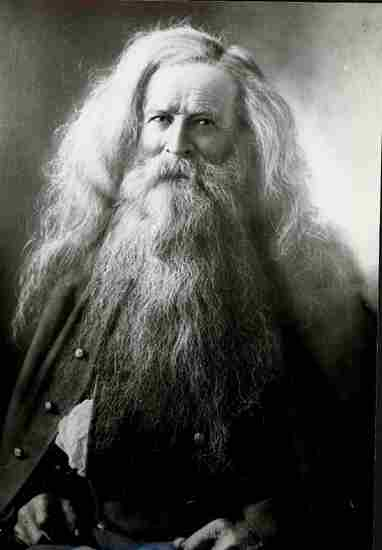Below are some notes regarding Cameron, compiled from information from a variety of sources, including the delightful book More True Tales of Old-Time Kansas by David Dary. I highly recommend all of Dary's books, available HERE through Amazon.Com.
Hugh Cameron: Life & Times
Childhood: The Family Farm
Hugh Cameron was born on a farm at Perth (near Saratoga Springs) New York in 1826. His father, Allen Cameron, had emigrated from Scotland, while his mother, Catherine Frazier, was probably born in New York. (Hugh stated in the 1880 census that Catherine was born in New York, whereas his younger brother stated in the same census that she was born in Scotland.) He was the third of six boys and two girls. He was almost entirely self-educated, although he did attend "normal school" starting at age 18.
Washington DC: Threatened by a PRO-slavery Mob
In 1849, at age 23, he was hired to teach mathematics at a private school in Washington DC. Here he became life-long friends with such prominent men as
Daniel Webster and
Stephen Douglas. In later years, Cameron would twice walk from Lawrence to Washington DC to stay with old friends and participate in the festivities surrounding the inaugeration of a new U.S. President.
His strong-anti slavery stance soon led to a friendship with Gen William Chaplain, a man Cameron describes as "the boldest champion of human liberty of that day." Chaplain was arrested while attempting to free the slaves of the congressman from Georgia. Cameron was considered (perhaps accurately) an accomplice in this adventure and was fired from his professorship. A day or two later he was attacked by a pro-slavery mob on the streets of Washington. He might have been murdered by the angry crowd were it not for the intervention of Henry Clay, then a United States senator from Kentucky, who stepped in and saved Cameron's life.

|
Lawrence Founding Father
Through his connections, Cameron was then appointed to a United States Treasury Department position by the Secretary of Treasury. Soon after, however, he developed a lung hemorrhage and, determined to restore his health, started a successful business walking door-to-door selling Harper's Magazine. Eager to explore the largely unexplored West, he later decided to join the New England abolitionists who were setting out for Kansas Territory and started walking west from Washington in 1853. Arriving in St Louis, he joined the first Emigrant Aid Society party from Massachusetts that was headed to Kansas Territory to found a free state settlement. He joined up, selling his only coat for boat fare up the Missouri River. After arriving in Kansas City, Cameron walked upstream along the Kansas River to a shallow bend where he set up his camp in July of 1854, thus becoming at age 28 one of the youngest founders of Lawrence, Kansas.
|
Kansas Territorial Judge: Saving Kansas from Slavery?
Soon after arriving Kansas Territory, Governor Reeder (not coincidently, another close friend of Stephen Douglas) appointed him Judge for the first Kansas Territorial election. It was an extremely controversial election since border ruffians from Missouri crossed the Missouri River in large numbers attempting to influence the outcome, which might have eventually led to Kansas entering the Union as a slave state. As Cameron explained it, "when the polls were surrounded by more than 1,000 ruffians, he did not abandon his post, although others fled. In making out the returns, he secured a certificate from the two Judges elected by the ruffian invaders that the votes cast at his precinct were not all by legal resident voters; and the returns being made in this form, furnished the Governor valid grounds on which to declare the election void, which he did." With this in mind, it is possible to argue that Cameron's actions might have prevented Kansas from eventually entering the union as a slave state. (This account, apparently written by Cameron in 3rd person form, is from William G Cutler's 1883 History of the State of Kansas, what some call a "vanity book" in that many of the biographies of early settlers were self-written.)



